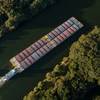A new ferry line between isolated North Korea and its neighbour Russia docked for the first time at the Russian Pacific port of Vladivostok on Thursday.
The ferry's Russian operators say it is purely a commercial venture, but it coincides with what some academics say is a drive by North Korea's leader, Kim Jong Un, to build ties with Moscow in case its closest ally China turns its back.
Journalists were unable to see passengers disembarking from the ship, the North Korean-flagged Mangyongbong, because Russian officials kept them away from the quayside, citing unspecified security reasons.
Reuters television was able to speak to three passengers, who said they were representatives of Chinese tourism agencies.
One of them showed reporters a photograph on her smartphone she said had been taken on board. The photograph showed a plaque with an inscription in Korean which, she said, bore the name of North Korea's long-dead founder Kim Il Sung.
The weekly ferry service, between Vladivostok and the North Korean port of Rajin, is pitched at Chinese tourists wanting to travel by sea to Vladivostok, according to the operators.
China has no ports on the sea of Japan, so travelling to North Korea and on to Vladivostok is the quickest way of reaching Vladivostok by sea.
"It's our business, of our company, without any state subsidies, involvement and help," Mikhail Khmel, the deputy director of Investstroytrest, the Russia firm operating the ferry, told reporters at the port.
North Korea is once again under international pressure over its nuclear weapons programme, after test-firing a ballistic missile on Sunday that landed in the sea near Russia.
The United States has been discussing possible new U.N. sanctions with China, which disapproves of the North's development of nuclear weapons and ballistic missiles to deliver them.
Russia, especially the port of Vladivostok, is home to one of the largest overseas communities of North Koreans in the world, and they send home many thousands of dollars in much-needed hard currency each month.
To date, there are no signs of a sustainable increase in trade between Russia and North Korea, but Russia has taken a more benign stance towards Pyongyang that other major powers.
Speaking in Beijing earlier this week, Russian President Vladimir Putin said Moscow was against North Korea's nuclear programme, but that the would should talk to Pyongyang instead of threatening it.
Asked about the ferry, Russian Foreign Ministry spokeswoman Maria Zakharova said on Thursday she "didn't see a connection" between the new service and political issues.
(Reporting by Valeria Fedorenko; Writing by Maria Tsvetkova; Editing by Christian Lowe and Pritha Sarkar)













